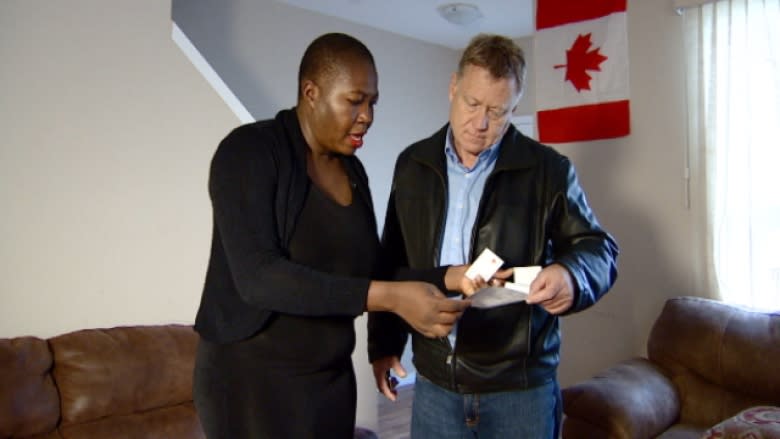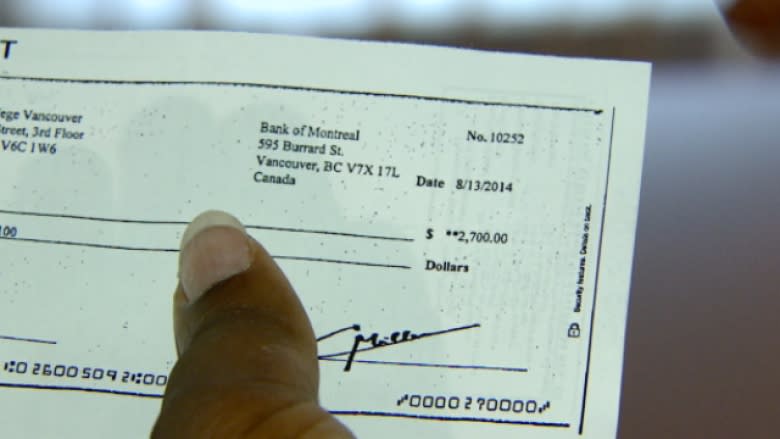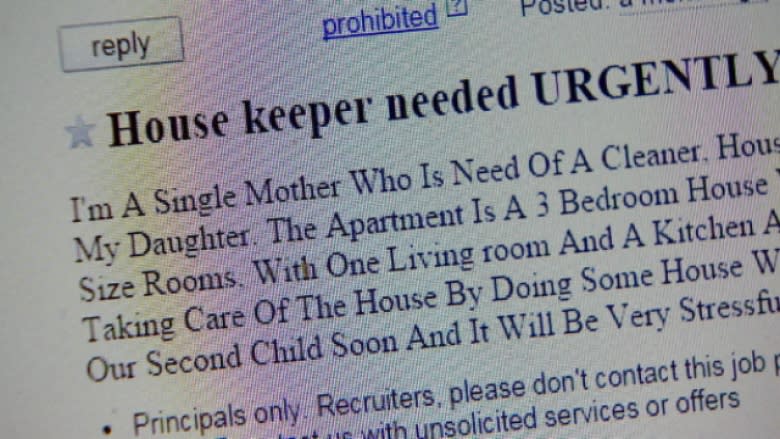Edmonton single mother barely escapes internet 'nanny scam'
An Edmonton single mother of two is warning she came a hair’s breadth away from being the latest victim of what’s known as “the nanny scam.”
Esther Sagesse unwittingly wired $2,000 to a scammer in California after her bank told her a cheque for $2,700 had been cleared for her to use.
The cheque turned out to be fraudulent.
An alert agent at Western Union in California became suspicious of the person who tried to claim the $2,000 and refused to release the money.
“Oh my goodness. That would mean I wouldn’t be able to pay the mortgage, the car payment, the food, everything,” Sagesse said.
Sagesse had answered an ad on Edmonton Craigslist from someone posing as a pregnant single mother moving to the city from Illinois, who was looking for help with childcare and housekeeping once she arrived.
“She says she is a single mom, she has a five year old,” Sagesse said. “We have a lot in common. Once you are a single mom, things are hard on you, so I thought I could help her.”
In emails, the scammer “Paula Lotche” flattered Sagesse, saying she was selected because of her integrity and sincerity.
“Lotche” said she would send a cheque to cover Sagesse's first week of pay, along with extra money for food and cleaning supplies. The keys to the home were already being couriered, she said.
Funds from fraudulent cheque 'now available to you,' bank tells fraud victim
Sagesse said a cheque for $2,700 arrived by courier on Aug. 17 and she immediately deposited it at an ATM.
CIBC held the cheque for five days and on Aug. 23 advised Sagesse the hold had expired.
“These funds are now available to you,” CIBC wrote in an electronic message posted to Sagesse's online account.
“Lotche” then emailed Sagesse to say her landlord was demanding a deposit and she needed $2,000 returned temporarily.
She asked for the money to be sent via Western Union to an address in California because that’s where the landlord was.
Sagesse, an immigrant from Haiti, said her first Canadian landlord wouldn’t accept personal cheques, so she wasn’t suspicious when asked to use Western Union, or that the landlord was supposedly in California.
“I’m like, 'maybe this is one of those big building management companies,'” Sagesse said.
Her suspicions were aroused however, when “Lotche” wrote an urgent email saying the landlord hadn’t received the money.
Sagesse said that when she called Western Union to find out what happened she was quizzed about the circumstances around the transfer.
She was told “Paula Lotche” was likely a scammer.
Western Union refunded her the $2,000 plus $377.90 in transfer fees.
Cheque should have been held longer and verified, bank says
“Oh, good Lord God of mercy! I felt really upset and embarrassed,” Sagesse said.
“How can somebody have the heart to do this?”
She blames CIBC for telling her the money was hers to spend.
“They should know better. They should know the account was fake because that’s what they do for a living.”
In an emailed statement, CIBC said it had coded Sagesse’s cheque incorrectly and should have held it longer – up to 30 days – for it to be properly verified.
CIBC spokesman Kevin Dove said the bank accepted responsibility for releasing the money to Sagesse before the cheque was verified.
The bank refunded service charges to Sagesse after inquiries from Go Public.
Dove said CIBC actively works to inform its customers how to avoid scams.
Scammer sought multiple victims, including Go Public
More than a week after Sagesse learned she had been scammed, Go Public responded to the same Craigslist ad.
In accordance with CBC journalism policy, Go Public could not lie or, if asked, deny we were journalists working on a story.
Within hours we received an email from paula.lotche@aol.com, followed by more emails containing the same boilerplate story of a single mother moving to town.
Nine days later Go Public received a cheque for $2,700 via UPS, sent from Birmingham, Alabama.
Four days after that, the scammer requested we send $1,800 of the money to her landlord in Ohio.
BMO confirmed the $2,700 cheque was bogus.
Bogus cheques claimed to be from international college accounts
The printing on the cheques sent to both Sagesse and Go Public indicated they were from Bank of Montreal accounts belonging to small private colleges catering to newcomers.
Sagesse's cheque claimed to have been from Greystone College in Vancouver.
Richard Novek, director of operations for ILSC Education Group, the college’s parent company, said although the cheque was fake, the account number on it was real.
“This particular account we don`t write cheques from,” Novek said. “It’s an account for incoming wire transfers.”
“We can't control what other people put on their fraudulent documents,” Novek said.
He said the college was in the process of closing the account.
The account number on Go Public’s cheque doesn’t exist, said Jim Campbell, general manager and vice-president of Columbia International College in Hamilton, Ont.
However, Campbell said the college’s account information is available online to anyone applying for admission. He confirmed at least one other case in the past three weeks.
'Nanny-scam' new version of fraud that’s cost Canadians millions, Anti-Fraud Centre says
Daniel Williams, with the Canadian Anti-Fraud Centre, said the nanny-scam is a new variation on a fraud that’s been occurring for about 10 years.
Williams said the scam is run by gangs who operate in different countries to foil police investigations.
“This is so sophisticated, there’s no chance [it] can be done by one or two people at a time,” Williams said.
So far in 2014, the centre has heard of more than $900,000 lost to the nanny-scam and other similar frauds, Williams said, adding this could be as little as five per cent of the total.
Williams said customers like Sagesse should not believe that, just because a bank clears a cheque, a fraud won’t be discovered later. He said the customer has the responsibility to ensure they are depositing a valid financial instrument.
Emails traced to Nigeria
After “Lotche” requested the $1,800, Go Public identified ourselves as journalists who were publishing a story about a scam.
We asked if Paula Lotche was a real person, whether she was a scammer, and offered the chance for comment.
There has been no response. The IP addresses for several of the emails indicate they went through Nigeria.
Esther Sagesse is relieved to have her money back, but said she’s telling her story to warn others.
“Somebody’s got to say something, she’s got be stopped.”




